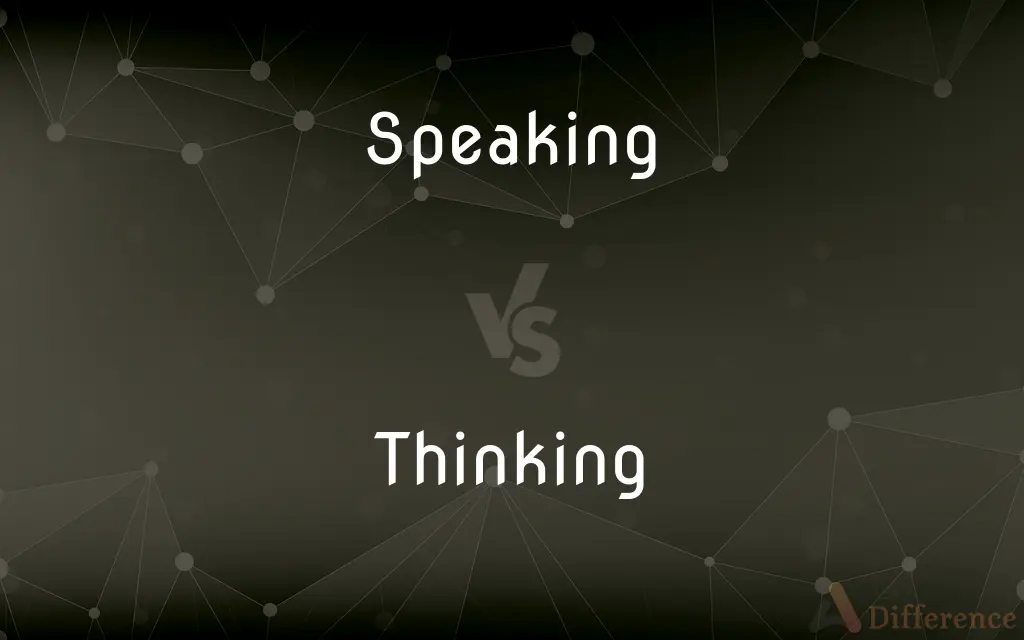Speaking vs. Thinking — What's the Difference?
By Maham Liaqat & Fiza Rafique — Published on July 12, 2024
Speaking involves vocalizing thoughts for communication, while thinking encompasses internal mental processes without vocalization.

Difference Between Speaking and Thinking
Table of Contents
ADVERTISEMENT
Key Differences
Speaking is the act of expressing thoughts, ideas, or feelings verbally, using language to communicate with others. It requires the physical process of using the vocal cords, mouth, and breath to produce sound. On the other hand, thinking involves the mental manipulation of information, such as forming ideas, making decisions, solving problems, and reflecting, all within the privacy of one's own mind, without necessarily being expressed outwardly.
While speaking can be spontaneous or planned, allowing for immediate interaction and feedback from others, thinking is an internal, often silent process that can be deliberate or unconscious, involving reflection, imagination, and reasoning without the immediate need for external validation or response. This distinction highlights the difference in the immediacy and social aspects of the two activities.
Speaking requires a listener for communication to be effective, relying on language, tone, and non-verbal cues like body language to convey messages accurately. Thinking, however, does not require an audience and is not bound by language or the physical limitations of speech, allowing for more abstract, complex, and nuanced internal dialogue.
The content of thinking can be more expansive and unrestricted than speaking, as it includes not only formulated ideas ready for verbal communication but also abstract thoughts, daydreams, and concepts that may never be vocalized. In contrast, speaking tends to filter and refine thoughts into a form that can be understood by others, often constrained by social norms, language structure, and the need for clarity.
Thinking can influence speaking, as the thoughts and ideas generated internally can become the content of spoken communication. Conversely, speaking can also influence thinking, as the act of verbalizing thoughts can clarify ideas, facilitate problem-solving, and promote new insights through dialogue with others.
ADVERTISEMENT
Comparison Chart
Medium
Verbal/vocal
Mental/internal
Audience
Requires a listener
Does not require an audience
Process
Vocalization of language
Mental manipulation of information
Constraints
Language, clarity, social norms
More abstract, not bound by language
Feedback
Immediate, from listeners
Internal, self-reflective
Purpose
Communication, expression
Reflection, decision-making, problem-solving
Compare with Definitions
Speaking
The act of conveying thoughts, feelings, or information verbally to others.
He enjoyed speaking at the conference, sharing his insights with the audience.
Thinking
The process of considering or reasoning about something within the mind.
The complex problem required a great deal of thinking to find a solution.
Speaking
The physical process of producing sound through the vocal cords to speak.
Vocalization exercises helped her improve her speaking clarity and projection.
Thinking
The act of thinking deeply or carefully about something.
Quiet moments in the morning were her favorite time for reflection and planning.
Speaking
A system of spoken or written symbols used in speaking to convey messages.
Learning a new language enhanced his speaking abilities and cultural understanding.
Thinking
The process of thinking through the steps to resolve a challenge.
Effective problem-solving often involves thinking outside the box for creative solutions.
Speaking
The process of making known one's thoughts or feelings through speaking.
She valued open expression, often speaking her mind in discussions.
Thinking
The faculty of thinking about or forming new ideas, images, or concepts.
His imagination was vivid, thinking up elaborate stories and worlds.
Speaking
The exchange of information or ideas through speaking.
Effective communication during the meeting helped resolve the misunderstanding.
Thinking
The cognitive process of thinking about and choosing between different options.
Decision-making was critical in her role, often requiring quick thinking in high-pressure situations.
Speaking
Capable of speech.
Thinking
The act or practice of one that thinks; thought.
Speaking
Involving speaking or talking
Has a speaking part in the play.
Thinking
A way of reasoning; judgment
To my thinking, this is not a good idea.
Speaking
(in compounds) Having competence in a language.
The English-speaking gentleman gave us directions; I travel in Russian-speaking countries; the French-speaking world listened in to the broadcast
Thinking
Characterized by thought or thoughtfulness; rational
We are thinking animals.
Speaking
The act of communicating vocally.
Thinking
Thought; gerund of think.
What is your thinking on this subject?
Speaking
Uttering speech; used for conveying speech; as, man is a speaking animal; a speaking tube.
Thinking
Having the faculty of thought; cogitative; capable of a regular train of ideas; as, man is a thinking being.
Speaking
Seeming to be capable of speech; hence, lifelike; as, a speaking likeness.
Thinking
The act of thinking; mode of thinking; imagination; cogitation; judgment.
I heard a bird so sing,Whose music, to my thinking, pleased the king.
Speaking
Capable of or involving speech or speaking;
Human beings--the speaking animals
A speaking part in the play
Thinking
The process of thinking (especially thinking carefully);
Thinking always made him frown
She paused for thought
Common Curiosities
Is speaking always a result of thinking?
Speaking often follows thinking, but it can also be spontaneous or reactive, not always preceded by deliberate thought.
Do we think in the same language we speak?
People often think in their native language, but thinking can also occur in abstract concepts or images not bound by language.
Can thinking occur without the ability to speak?
Yes, thinking can occur independently of speech ability, as it is an internal cognitive process.
How does thinking influence speaking?
Thinking shapes the content and clarity of speaking, as ideas and concepts are formulated mentally before being expressed verbally.
How do silence and speaking relate to thinking?
Silence can provide the space for deeper thinking and reflection, while speaking can be a way to share and expand upon those thoughts with others.
Is speaking necessary for learning?
While not strictly necessary, speaking can enhance learning through discussion, feedback, and the verbal reinforcement of concepts.
Can thinking change how we speak?
Yes, changes in thinking, such as shifts in perspective or new insights, can influence the way we speak and communicate ideas.
How does thinking without language differ from thinking with language?
Thinking without language can involve more abstract, non-verbal forms of thought, such as visual images or feelings, while thinking with language is structured and shaped by the grammar and vocabulary of the language.
Can speaking help clarify thinking?
Yes, verbalizing thoughts can help clarify and refine ideas, making complex concepts easier to understand and communicate.
How do emotions influence speaking and thinking?
Emotions can strongly influence both speaking and thinking, affecting clarity, focus, and the ability to communicate or process information effectively.
Can everyone think the same way they speak?
Individuals may think differently from how they speak, as thinking can include more complex, abstract, or nuanced ideas than those typically expressed in speech.
Is it possible to think about nothing?
It's challenging to think about "nothing," as the mind tends to be always active, though focusing on a single, simple concept can feel like thinking about nothing.
Can thinking be trained or improved?
Yes, thinking skills like critical thinking, problem-solving, and decision-making can be improved through practice and education.
Is there a difference in brain activity when thinking vs. speaking?
Yes, different areas of the brain are activated during thinking and speaking, reflecting the distinct cognitive processes involved in each activity.
Does speaking multiple languages affect thinking?
Yes, speaking multiple languages can influence thinking, offering different perspectives and cognitive flexibility.
Share Your Discovery

Previous Comparison
Methyl Chloride vs. Methylene Chloride
Next Comparison
Windows Application vs. Web ApplicationAuthor Spotlight
Written by
Maham LiaqatCo-written by
Fiza RafiqueFiza Rafique is a skilled content writer at AskDifference.com, where she meticulously refines and enhances written pieces. Drawing from her vast editorial expertise, Fiza ensures clarity, accuracy, and precision in every article. Passionate about language, she continually seeks to elevate the quality of content for readers worldwide.














































